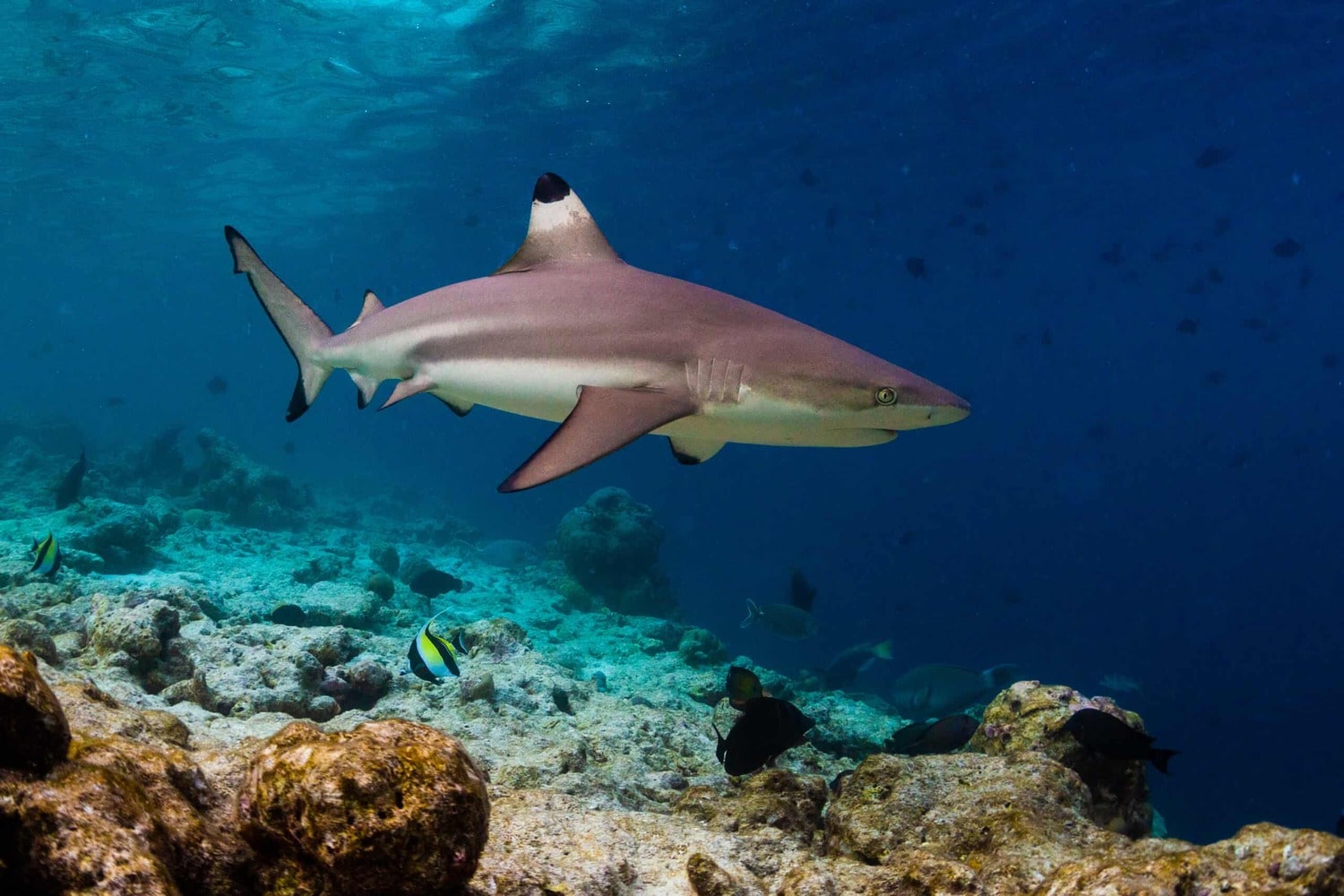Reef sharks are among the most common inhabitants of tropical seas, frequently spotted around coral reefs. They attract attention not only with their graceful movements but also with their unique biological and behavioral traits. These predators play a key role in marine ecosystems, maintaining balance among different species. Many people consider them dangerous, yet most species rarely pose a threat to humans. Here are some fascinating facts about reef sharks that you might not have known.
- Reef sharks consist of several species, the most well-known being the grey reef shark, the blacktip reef shark, the whitetip reef shark, and the dwarf reef shark. Each of these species has distinctive behavioral and physical features. They are found in the tropical waters of the Indian and Pacific Oceans.
- The grey reef shark is considered one of the most aggressive among its relatives. It can display a typical threat posture by arching its back and lowering its fins. This behavior serves as a warning to other sharks and potential rivals.
- Blacktip reef sharks are easily recognized by the black tips on their fins. They often appear in lagoons and near reefs, sometimes swimming close to divers. Despite their predatory appearance, they rarely attack humans.
- Whitetip reef sharks are well known for their nocturnal activity. They are capable of entering narrow coral crevices in search of prey. Their elongated bodies allow them to maneuver with ease in difficult places.
- Reef sharks play a vital role in marine ecosystems. They regulate the populations of fish and other marine animals, preventing certain species from overpopulating. This helps maintain balance within coral reef environments.
- On average, reef sharks grow up to two meters long, though some individuals can reach three meters. Their lifespan is usually around twenty-five years. In natural conditions, some may live even longer.
- Their diet includes a wide range of prey, such as fish, octopuses, and crustaceans. They are fast hunters capable of sudden bursts of speed to catch their targets. Sometimes they hunt in groups, which increases their success rate.
- Reef sharks are known for their cautious nature. They avoid excessive contact with humans and usually swim away when threatened. This makes them less dangerous compared to some other shark species.
- They are well adapted to life around coral reefs thanks to their sharp eyesight and sensitivity to electrical impulses. Special organs known as the ampullae of Lorenzini allow them to detect even the slightest movements of prey. This ability helps them hunt effectively even at night.
- Interestingly, reef sharks can remain still on the seabed while continuing to breathe. They can pump water through their gills without swimming. This sets them apart from many other sharks that must swim constantly to breathe.
- Territorial behavior is often observed among reef sharks. They may guard a specific part of the reef where they find shelter and food. Such behavior contributes to population stability.
- It is known that reef sharks sometimes follow divers or swimmers at a close distance. This is driven not by aggression but by curiosity. Such encounters are rarely dangerous, though caution is always advised.
- Their teeth are arranged in several rows and are constantly replaced. When one tooth falls out or is damaged, a new one quickly grows in its place. This ensures they remain efficient hunters throughout their lives.
- Reef sharks have a unique swimming ability. They can make sharp turns even in narrow spaces, which helps them pursue prey among corals. This agility makes them true masters of the reef.
- Although reef sharks are generally considered safe, there have been occasional reports of attacks on humans. However, such incidents are very rare and usually occur when the animal feels threatened. Most encounters with these sharks are peaceful.
- Reef sharks often attract attention in scuba diving tourism programs. Their wide distribution and striking appearance draw divers from around the world. This supports the development of ecotourism in tropical regions.
- Populations of reef sharks are under threat due to overfishing and the destruction of coral reefs. They are often caught for their fins and meat. As a result, their numbers are declining in many areas.
- Some countries have implemented protection programs for reef sharks. These include bans on commercial fishing and the creation of marine reserves. Such measures help preserve these species for future generations.
- Reef sharks sometimes display social behavior. They may gather in larger groups during hunting or migration. This indicates the complexity of their interactions in the wild.
- Scientists continue to study reef sharks intensively because they are indicators of coral reef health. Their populations are directly linked to the overall condition of the ecosystem. For this reason, reef sharks are considered an important subject of ecological research.
Reef sharks are extraordinary creatures that combine strength, elegance, and unique qualities. Interesting facts about them show that they are not only skilled hunters but also guardians of marine ecosystems. Astonishing facts highlight the importance of preserving them to maintain natural balance. You might not have known many of these details, but now reef sharks appear in an entirely new light.





